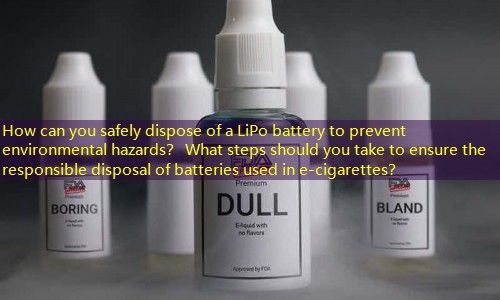Understanding the Importance of Proper Lipo Battery Disposal
Lithium Polymer (LiPo) batteries are widely used in numerous electronic devices, including e-cigarettes, due to their lightweight and high energy density. However, improper disposal of these batteries can lead to significant environmental hazards and safety risks. Therefore, it is essential to understand the proper methods and protocols for disposing of a LiPo battery safely.
1. Recognizing the Risks
Before disposing of a LiPo battery, it is crucial to recognize the potential risks associated with improper disposal. These batteries are known to be volatile if punctured or damaged, leading to fire hazards and explosions. Additionally, when LiPo batteries are improperly discarded in landfills, they can leak harmful chemicals into the environment, posing serious ecological threats.
2. Preparing the Battery for Disposal
Proper preparation of the LiPo battery is critical before disposal. Here are the steps to take:
2.1 Discharge the Battery
Discharge the LiPo battery to a safe level before disposal. Ideally, this should be around 3.7 volts per cell. You can use a battery discharger specifically designed for LiPo batteries or connect the battery to a device (like an LED light) until it reaches this level. Never short the battery terminals, as this may cause a fire.
2.2 Securely Tape the Terminals
After discharging, use electrical tape to cover the battery terminals. This precaution is vital to prevent short-circuiting during storage or transport, which could lead to dangerous situations.
3. Finding a Disposal Facility
Identifying the correct disposal facility is essential for the safe disposal of LiPo batteries. Here are ways to find one:

3.1 Local Recycling Centers
Many local recycling centers accept LiPo batteries for safe disposal. Research nearby facilities to determine if they have proper recycling programs in place for lithium batteries.
3.2 Hazardous Waste Collection Events
In many areas, municipal hazardous waste collection events are organized periodically. Participating in these events ensures your LiPo batteries are disposed of safely and responsibly.
4. Alternative Disposal Options
If local facilities are unavailable, consider the following alternatives:
4.1 Manufacturer Take-Back Programs
Some manufacturers provide take-back programs for old batteries. Check with your e-cigarette manufacturer to see if they offer such a program, as they may have specific guidelines for returning used LiPo batteries.
4.2 Mail-In Recycling Programs
There are mail-in recycling programs that allow you to send your used batteries to a recycling facility. Research reputable companies that provide this service and ensure they follow all safety guidelines for disposing of LiPo batteries.
5. Safety Precautions During Transportation
When transporting LiPo batteries to a disposal facility, taking necessary safety precautions is critical.
5.1 Use a Fireproof Container
Transport the batteries in a fireproof container or bag to minimize the risk of fire in case of an accident. This container will contain any potential fire or smoke that may arise from thermal runaway.
5.2 Keep Away from Flammable Materials
Ensure that the container is kept away from flammable materials during transport. Avoid leaving the batteries in hot or humid environments, as high temperatures can lead to instability.
6. Post-Disposal Considerations
After disposing of your LiPo battery, consider the following:
6.1 Educate Others
Raise awareness about the importance of safe battery disposal within your community. Sharing your knowledge can prevent others from making the same mistakes.
6.2 Stay Updated on Regulations
Follow local guidelines and regulations regarding battery disposal, as they may change over time. Staying informed promotes safe practices within the community.
Conclusion
Disposing of a LiPo battery requires careful consideration and adherence to safety protocols to prevent environmental harm and personal injury. Properly discharging the battery, utilizing the right disposal methods, remaining informed about local regulations, and promoting awareness are crucial steps in ensuring a responsible approach to LiPo battery disposal. By following these guidelines, you can contribute to a safer and cleaner environment.








